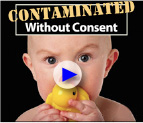Contact: Coming Clean, (802) 251-0203, info@comingcleaninc.org
December 14, 2009
Government Official Warns Public of BPA Exposure
Toxic Chemical Bisphenol A Still Not Banned by FDA
Enough Known For Agency To Immediately Ban Synthetic Sex Hormone Linked to Cancer
San Francisco, CA – Scientists, physicians, consumers, and environmental health advocates responded with relief on Friday when the Milwaukee Journal Sentinel reported that the administrator of the National Institute of Environmental Health Sciences (NIEHS), Dr. Linda Birnbaum, cautioned the public to avoid exposure to bisphenol A (BPA), a synthetic sex hormone linked to illness. Birnbaum's announcement comes as frustration and concern mounts for the missed deadline by the U.S. Food and Drug Administration (FDA) for its expected November 30th announcement that it would release its safety review of BPA. Modern studies of BPA have demonstrated links to cancer, behavioral changes, reproductive harm, abnormal metabolism, and other illnesses. Neither the FDA announcement nor their review were made available on November 30th, and environmental health advocates are wondering why there is a delay.
Congressmen Henry Waxman and Bart Stupak had formally asked for FDA to re-review their August 2008 assessment of BPA after its own scientific subcommittee ruled that it had ignored scores of valid studies showing BPA is harmful, and recommended that the agency reconsider its ruling that the chemical is safe for food-contact uses.
Senator Dianne Feinstein, D-CA, and Rep. Edward Markey, D-MA, have introduced bills — S.593 and H.R. 1523 — to restrict BPA in food and beverage containers. Senator Charles Schumer, D-NY, has introduced S. 753 that restricts BPA in select children’s products. Yesterday, both Senator Schumer and Senator Kirsten Gillibrand called for a ban of BPA in children's products, citing Consumers Union's recent study of canned foods that revealed BPA in almost all of the 19 name-brand foods tested. Rep. Anthony Weiner (D-NY) is matching Senator Schumer's bill in the House. EPA Administrator Lisa Jackson identified BPA as one of six chemicals requiring attention as legislative discussions continue about reforming the federal Toxic Substances Control Act.
Sarah Janssen, MD, PhD, staff scientist, Natural Resources Defense Council: “Just as you rely on your doctor for medical advice, FDA must rely on the advice of scientific experts. The levels of BPA in our food supply have been associated with a wide range of health effects. Dozens of independent scientists, including the Director of NIEHS, have advised reducing BPA exposure. It’s time for FDA to act on their advice." NRDC filed a petition in October, 2008 asking FDA to revoke the approval of and ban BPA as a food additive. FDA has yet to rule on this petition.
Bobbi Chase Wilding, organizing director of Clean New York, pregnant with her second child says, “Every day, women of child bearing age and our babies are put in danger because this toxic chemical is used the products we rely on. Recent studies found BPA in the bodies of pregnant women and health care providers. FDA needs to protect us now and not delay any further.”
Accusations of industry influence on FDA decision-making on BPA plagued the agency in 2008.
Mia Davis, BPA Coordinator for Clean Water Action says, “About 90% of independent, non-industry funded studies find BPA to be harmful at low, relevant doses, so it is unclear why FDA has further delayed it decision. We hope that they will act to protect citizens, and soon.”
Janet Nudelman of the Breast Cancer Fund says, “We know that even low-dose exposure to this extremely toxic, hormonally active chemical has been linked to an increased risk of breast cancer and other adverse health effects, suggesting there is no safe level of exposure to BPA. That should be reason enough for the FDA to announce an immediate ban on BPA in polycarbonate food and beverage containers. The FDA should also require product labeling of canned goods containing BPA so consumers can protect their families from this hormonally active chemical.”
Urvashi Rangan, PhD, toxicologist with Consumers Union, which conducted the recent study that revealed BPA contamination in a diverse assortment of canned foods, says, “Consumers can’t know how much BPA is in any given can of food pulled off the shelf. Considering what we already know, it’s time for the marketplace to switch to safer alternatives for can linings. Dr. Birnbaum's reported statement in the Milwaukee Journal Sentinel echoes this call.” More than 18,000 consumers have already signed the ongoing CU petition at buysafeeatwell.org asking FDA to ban BPA in food contact substances.
“Restrictions on BPA have been put in place in Connecticut, Minnesota, Chicago, and three New York counties and legislation has been introduced in 30 states and localities,” according to Sarah Uhl from Coalition for a Safe and Healthy Connecticut, where BPA is banned from reusable food and beverage containers and infant formula cans.
Canada has declared BPA a toxic chemical, and US states and municipalities are taking action, including product bans and warnings to limit BPA exposures.
Renee Hackenmiller-Paradis, MPH, PhD, is working on a BPA ban in Oregon, “Why do states have to work on their own, essentially, to protect our residents? FDA should be looking out for everyone in this country.”
Mike Schade of the Center for Health, Environment & Justice says, "Some local and state governments have banned the sale of BPA-contaminated products, and retailers are taking them off their shelves. The FDA needs to act now."
Kristen Welker-Hood, ScD, MSN, RN, director of Environment and Health Programs, Physicians for Social Responsibility says, “More and more illness linked to endocrine disrupting chemicals are being seen by health care providers, including systemic inflammation such as diabetes, cardiac illness, metabolic syndrome and other effects. FDA needs to ban BPA now."
“It’s shocking and disappointing the FDA is not acting with greater urgency protect the public from further BPA exposure,” said David Wallinga, MD, MPA, physician with Healthy Legacy, a public health coalition instrumental in Minnesota becoming the first state to ban some BPA-containing children’s products earlier this year. “After all BPA, just like DES and other synthetic estrogens already banned, is now linked with higher risks of hormone-related disease.”
“As we celebrate the Christmas season, we are reminded of Jesus’ commitment to those in poverty and other vulnerable populations such as children. In these times of economic hardship when more people depend on food banks, we hope that the FDA will ensure that cans are labeled when they contain BPA and that they will begin to require BPA-lined cans to be replaced with safe alternatives,” says Chloe Schwabe, Assistant Director for Environmental Health at the National Council of Churches.
Joan Blades, president of MomsRising says, "The FDA's decision to delay its safety review of BPA is not only disappointing, it's dangerous for the health of families. This chemical is a known toxin and has been banned in numerous other countries for precisely that reason. It is simply too much to ask parents to try to act as scientists and discern which products are safe for them and their families. Those products shouldn't be on store shelves in the first place."
“There is evidence that low income people are even more exposed to BPA than others, and suffer toxic effects to a greater extent. FDA needs to protect the most vulnerable groups, including children and low income people, by banning BPA." according to Mark A. Mitchell, M.D., MPH, FACPM, President, Connecticut Coalition for Environmental Justice.
Experts with direct contact info: http://www.louisvillecharter.org/press
Available for Interviews
- Sarah Janssen, MD, PhD, staff scientist at the Natural Resources Defense Council, 415-875-6126. Dr. Janssen can address health effects linked to BPA exposure and scientific integrity issues regarding BPA regulatory process.
- Mia Davis, former BPA Coordinator for Clean Water Action, former Co-Coordinator, Workgroup for Safe Markets 617-338-8131, x201.
- Janet Nudelman, Director of Program and Policy at the Breast Cancer Fund. To schedule an interview, please contact Shannon Coughlin, 415-336-2246.
- Bobbi Chase Wilding, Organizing Director, Clean and Healthy New York, pregnant mom and National BPA Coordinator, Workgroup for Safe Markets, 518-708-3875.
- Mike Schade, Center for Health, Environment and Justice, 212-964-3680. Mike can address retailers pulling BPA products from their shelves and changes with manufacturers.
- Sarah Uhl, Coordinator, Coalition for a Safe & Healthy Connecticut, 860-232-6232. The Coalition worked to pass state legislation that is currently the most health protective policy on BPA in food and beverage containers worldwide.
- Richard A. Liroff, Ph.D., Executive Director, Investor Environmental Health Network, 703-532-2929. Rich can address the story of BPA manufacturer Sunoco refusing to sell its product to companies that make food products that might expose children to BPA.
- Naomi Starkman, Consumers Union, for report information: 917-539-3924.
- Renee Hackenmiller-Paradis, Program Director, Oregon Environmental Council 503.222.1963 x110. The state of Oregon is working on a BPA ban right now.
- David Wallinga, MD, MPA, Healthy Legacy, 612-423-9666. Dr Wallinga can address health effects of BPA.
- Chloe Schwabe, Assistant Director for Environmental Health, National Council of Churches, 202-481-6932.
- Mark A. Mitchell, M.D., MPH, FACPM. Consultant for the American Medical Association. Mark can address environmental justice aspects of BPA exposure.
Resources
- It's best to avoid BPA, federal official says: Chemical's effects a concern to head of health agency, Milwaukee Journal Sentinel, December 11, 2009
- Earliest Exposures, Toxic Chemicals in Pregnant Women, Washington Toxics Coalition, November 17, 2009 (includes BPA)
- Consumers Union Report on BPA in Food Containers, November 2, 2009
- Toxic Chemicals Found in Doctors and Nurses, October 8, 2009
- Physicians for Social Responsibility, Clean New York, American Nurses Association, Health Care Without Harm, Safer Chemicals, Healthy Families
- FDA relied heavily on BPA lobby Regulators actively reached out to industry Milwaukee Journal Sentinel, May 16, 2009
- Baby's Toxic Bottle Report (including BPA fact sheet), Center for Health, Environment and Justice
- Is It In Us? Biomonitoring study shows BPA contamination in the bodies of 35 people nationwide
- Chemical Offender: Bisphenol A, Breast Cancer Fund
# # #




